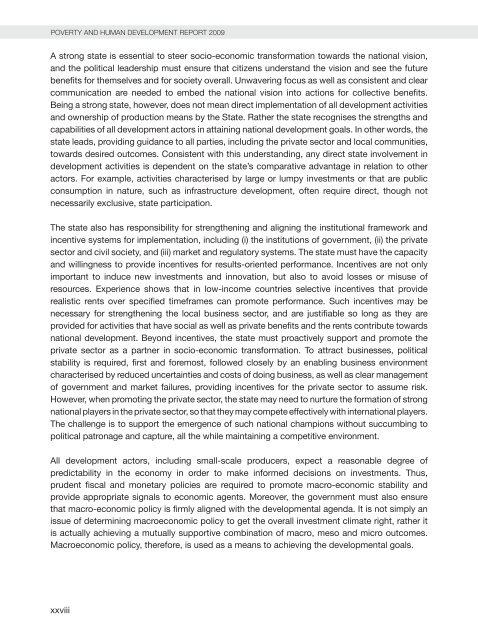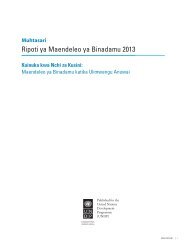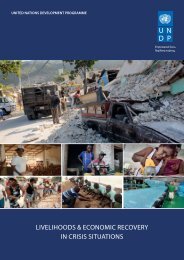Poverty and Human Development Report 2009 - UNDP in Tanzania
Poverty and Human Development Report 2009 - UNDP in Tanzania
Poverty and Human Development Report 2009 - UNDP in Tanzania
You also want an ePaper? Increase the reach of your titles
YUMPU automatically turns print PDFs into web optimized ePapers that Google loves.
pOVertY aND hUMaN DeVeLOpMeNt repOrt <strong>2009</strong><br />
A strong state is essential to steer socio-economic transformation towards the national vision,<br />
<strong>and</strong> the political leadership must ensure that citizens underst<strong>and</strong> the vision <strong>and</strong> see the future<br />
benefits for themselves <strong>and</strong> for society overall. Unwaver<strong>in</strong>g focus as well as consistent <strong>and</strong> clear<br />
communication are needed to embed the national vision <strong>in</strong>to actions for collective benefits.<br />
Be<strong>in</strong>g a strong state, however, does not mean direct implementation of all development activities<br />
<strong>and</strong> ownership of production means by the State. Rather the state recognises the strengths <strong>and</strong><br />
capabilities of all development actors <strong>in</strong> atta<strong>in</strong><strong>in</strong>g national development goals. In other words, the<br />
state leads, provid<strong>in</strong>g guidance to all parties, <strong>in</strong>clud<strong>in</strong>g the private sector <strong>and</strong> local communities,<br />
towards desired outcomes. Consistent with this underst<strong>and</strong><strong>in</strong>g, any direct state <strong>in</strong>volvement <strong>in</strong><br />
development activities is dependent on the state’s comparative advantage <strong>in</strong> relation to other<br />
actors. For example, activities characterised by large or lumpy <strong>in</strong>vestments or that are public<br />
consumption <strong>in</strong> nature, such as <strong>in</strong>frastructure development, often require direct, though not<br />
necessarily exclusive, state participation.<br />
The state also has responsibility for strengthen<strong>in</strong>g <strong>and</strong> align<strong>in</strong>g the <strong>in</strong>stitutional framework <strong>and</strong><br />
<strong>in</strong>centive systems for implementation, <strong>in</strong>clud<strong>in</strong>g (i) the <strong>in</strong>stitutions of government, (ii) the private<br />
sector <strong>and</strong> civil society, <strong>and</strong> (iii) market <strong>and</strong> regulatory systems. The state must have the capacity<br />
<strong>and</strong> will<strong>in</strong>gness to provide <strong>in</strong>centives for results-oriented performance. Incentives are not only<br />
important to <strong>in</strong>duce new <strong>in</strong>vestments <strong>and</strong> <strong>in</strong>novation, but also to avoid losses or misuse of<br />
resources. Experience shows that <strong>in</strong> low-<strong>in</strong>come countries selective <strong>in</strong>centives that provide<br />
realistic rents over specified timeframes can promote performance. Such <strong>in</strong>centives may be<br />
necessary for strengthen<strong>in</strong>g the local bus<strong>in</strong>ess sector, <strong>and</strong> are justifiable so long as they are<br />
provided for activities that have social as well as private benefits <strong>and</strong> the rents contribute towards<br />
national development. Beyond <strong>in</strong>centives, the state must proactively support <strong>and</strong> promote the<br />
private sector as a partner <strong>in</strong> socio-economic transformation. To attract bus<strong>in</strong>esses, political<br />
stability is required, first <strong>and</strong> foremost, followed closely by an enabl<strong>in</strong>g bus<strong>in</strong>ess environment<br />
characterised by reduced uncerta<strong>in</strong>ties <strong>and</strong> costs of do<strong>in</strong>g bus<strong>in</strong>ess, as well as clear management<br />
of government <strong>and</strong> market failures, provid<strong>in</strong>g <strong>in</strong>centives for the private sector to assume risk.<br />
However, when promot<strong>in</strong>g the private sector, the state may need to nurture the formation of strong<br />
national players <strong>in</strong> the private sector, so that they may compete effectively with <strong>in</strong>ternational players.<br />
The challenge is to support the emergence of such national champions without succumb<strong>in</strong>g to<br />
political patronage <strong>and</strong> capture, all the while ma<strong>in</strong>ta<strong>in</strong><strong>in</strong>g a competitive environment.<br />
All development actors, <strong>in</strong>clud<strong>in</strong>g small-scale producers, expect a reasonable degree of<br />
predictability <strong>in</strong> the economy <strong>in</strong> order to make <strong>in</strong>formed decisions on <strong>in</strong>vestments. Thus,<br />
prudent fiscal <strong>and</strong> monetary policies are required to promote macro-economic stability <strong>and</strong><br />
provide appropriate signals to economic agents. Moreover, the government must also ensure<br />
that macro-economic policy is firmly aligned with the developmental agenda. It is not simply an<br />
issue of determ<strong>in</strong><strong>in</strong>g macroeconomic policy to get the overall <strong>in</strong>vestment climate right, rather it<br />
is actually achiev<strong>in</strong>g a mutually supportive comb<strong>in</strong>ation of macro, meso <strong>and</strong> micro outcomes.<br />
Macroeconomic policy, therefore, is used as a means to achiev<strong>in</strong>g the developmental goals.<br />
xxviii





